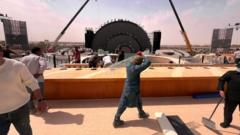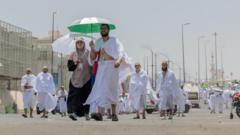Reports indicate an alarming trend of preventable employer-related deaths among laborers, urging governmental action and accountability.
Surge in Migrant Worker Deaths Raises Alarm Ahead of Saudi Arabia's 2034 World Cup

Surge in Migrant Worker Deaths Raises Alarm Ahead of Saudi Arabia's 2034 World Cup
Human rights advocates express concern over the rising fatalities among migrant construction workers in Saudi Arabia as the nation gears up for the upcoming World Cup.
Human rights organizations are sounding the alarm on a rising trend in deaths of migrant workers in Saudi Arabia's construction sector as the country prepares for the 2034 World Cup. Reports published by Human Rights Watch and FairSquare highlight that many of these fatalities are linked to preventable workplace hazards, with numerous incidents misclassified as occurring from natural causes, depriving grieving families of compensation.
Minky Worden, director of Global Initiatives at Human Rights Watch, pointed out that while the upcoming World Cup may be the largest and most expensive in history, it could also usher in unprecedented costs in human lives as millions of migrant workers contribute to building critical infrastructure, including numerous stadiums, a rail network, and substantial accommodations.
The warnings coincided with a recent visit by FIFA President Gianni Infantino and former President Donald Trump to Saudi Arabia for a US-Saudi investment conference. Infantino gave assurances about FIFA’s commitment to human rights during its operations, yet the organization's critics have accused it of not adequately addressing the lessons learned from the concerning worker fatalities surrounding the 2022 World Cup in Qatar.
Data on migrant worker deaths is notoriously sparse in Saudi Arabia due to restricted access for human rights groups and the prohibition of labor unions. Still, Human Rights Watch has managed to speak with the families of 31 deceased workers from nations such as Bangladesh, India, and Nepal, who suffered serious accidents, including fatal falls, machinery-related incidents, and electrocutions. Another pressing concern is the extreme heat that construction workers face as preparations accelerate for the World Cup.
Incidents of worker fatalities are on the rise; a recent case involved a Pakistani foreman who died from a fall at a construction site for a World Cup venue in Al Khobar – the first recorded death tied to World Cup preparations. Despite previous government claims of progress in occupational safety, and FIFA acknowledging "significant steps" taken in labor law reforms, the global construction workers' union, BWI, notes a troubling increase in accidents attributed to systemic negligence and insufficient monitoring.
Healthcare systems in Saudi Arabia commonly do not conduct autopsies on migrant worker deaths, leading to calls from FairSquare for greater accountability. As co-director James Lynch emphasized, legions of young laborers are caught in a perilous labor system that not only jeopardizes their lives but also leaves families in the dark regarding the circumstances surrounding their deaths.
While FIFA has announced plans to implement a workers' welfare system to enforce safety standards at World Cup sites, critics are wary of such promises lacking substance. Human Rights Watch insists that adequate investigations into migrant worker fatalities, regardless of their perceived causes, are imperative, alongside ensuring that bereaved families receive dignified treatment and just compensation.
The Saudi government has yet to comment on the criticisms raised by human rights groups, which remain skeptical of the claimed advancements in labor safety regulations amidst ongoing risks faced by migrant workers.
Minky Worden, director of Global Initiatives at Human Rights Watch, pointed out that while the upcoming World Cup may be the largest and most expensive in history, it could also usher in unprecedented costs in human lives as millions of migrant workers contribute to building critical infrastructure, including numerous stadiums, a rail network, and substantial accommodations.
The warnings coincided with a recent visit by FIFA President Gianni Infantino and former President Donald Trump to Saudi Arabia for a US-Saudi investment conference. Infantino gave assurances about FIFA’s commitment to human rights during its operations, yet the organization's critics have accused it of not adequately addressing the lessons learned from the concerning worker fatalities surrounding the 2022 World Cup in Qatar.
Data on migrant worker deaths is notoriously sparse in Saudi Arabia due to restricted access for human rights groups and the prohibition of labor unions. Still, Human Rights Watch has managed to speak with the families of 31 deceased workers from nations such as Bangladesh, India, and Nepal, who suffered serious accidents, including fatal falls, machinery-related incidents, and electrocutions. Another pressing concern is the extreme heat that construction workers face as preparations accelerate for the World Cup.
Incidents of worker fatalities are on the rise; a recent case involved a Pakistani foreman who died from a fall at a construction site for a World Cup venue in Al Khobar – the first recorded death tied to World Cup preparations. Despite previous government claims of progress in occupational safety, and FIFA acknowledging "significant steps" taken in labor law reforms, the global construction workers' union, BWI, notes a troubling increase in accidents attributed to systemic negligence and insufficient monitoring.
Healthcare systems in Saudi Arabia commonly do not conduct autopsies on migrant worker deaths, leading to calls from FairSquare for greater accountability. As co-director James Lynch emphasized, legions of young laborers are caught in a perilous labor system that not only jeopardizes their lives but also leaves families in the dark regarding the circumstances surrounding their deaths.
While FIFA has announced plans to implement a workers' welfare system to enforce safety standards at World Cup sites, critics are wary of such promises lacking substance. Human Rights Watch insists that adequate investigations into migrant worker fatalities, regardless of their perceived causes, are imperative, alongside ensuring that bereaved families receive dignified treatment and just compensation.
The Saudi government has yet to comment on the criticisms raised by human rights groups, which remain skeptical of the claimed advancements in labor safety regulations amidst ongoing risks faced by migrant workers.




















